Ata-ul-Haye Nasir, Ahmadiyya Archive & Research Centre
Exactly 50 years ago, on 7 September 1974, the Parliament of Pakistan declared Ahmadis as non-Muslims. This action was contrary to the Sunnah and the sayings of the Holy Prophet Muhammadsa. The opponents of the Ahmadiyya Muslim Jamaat acted under the guise of religion, though their decision was rooted in political interests.
In addition to being contrary to Islamic teachings, this decision was also against the guidance given by the founder of Pakistan, Muhammad Ali Jinnah, in a speech on 11 August 1947:
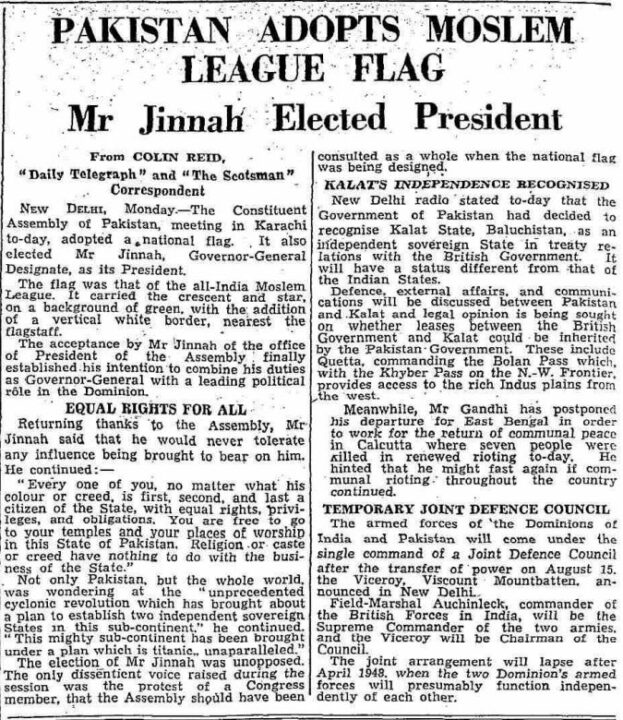
“Every one of you, no matter what his colour or creed, is first, second, and last a citizen of the State, with equal rights, privileges, and obligations. You are free to go to your temples and your places of worship in this State of Pakistan. Religion or caste or creed have nothing to do with the business of the State.” (The Scotsman, 12 August 1947, p. 4)
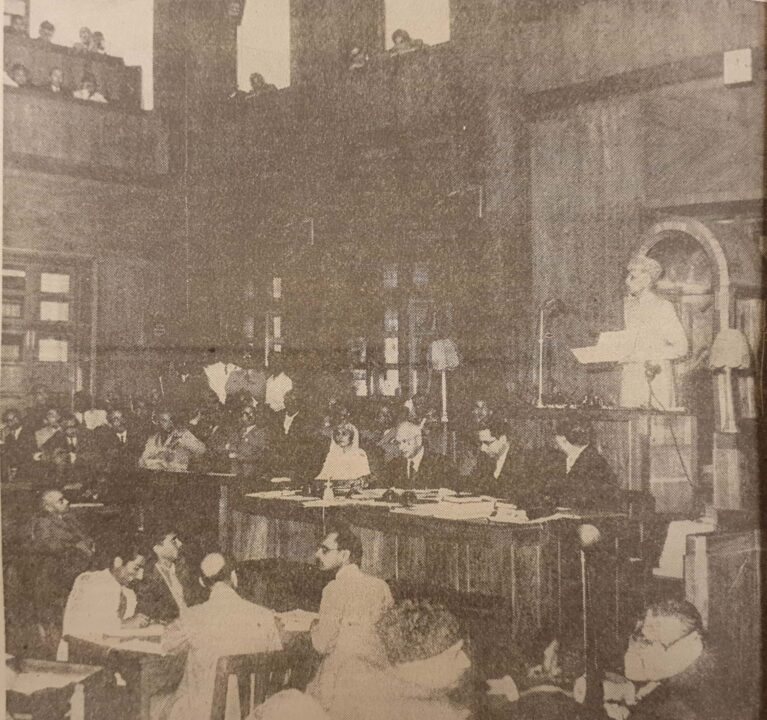
A letter from Hazrat Khalifatul Masih IIIrh
On 7 September 1974, the day Ahmadis were declared non-Muslims, Hazrat Hafiz Mirza Nasir Ahmadrh, the then Ahmadiyya Khalifa, wrote a detailed letter to Hazrat Sir Chaudhry Zafrulla Khanra, and stated:
“It is currently 12pm, Saturday, 7 September [1974]. The circumstances indicate that the decision will be against us. It will be announced this evening. You would be informed about this before this note [reaches you].
“The worldly legal strategies will obviously be carried out, hence, I require your view on this. However, our real strategy is du‘a. We do not require any certificate from the Government regarding our [belief in] Islam. We have with us the certificate from Allah the Almighty which is sufficient for us. And all praise belongs to Allah. Our duty is to pray with meekness and to seek His grace. The world will obviously protest, however, the real point is that Ahmadis of the whole world ought to occupy themselves in humble prayers and wait for the Powerful Help from their Generous Lord.”
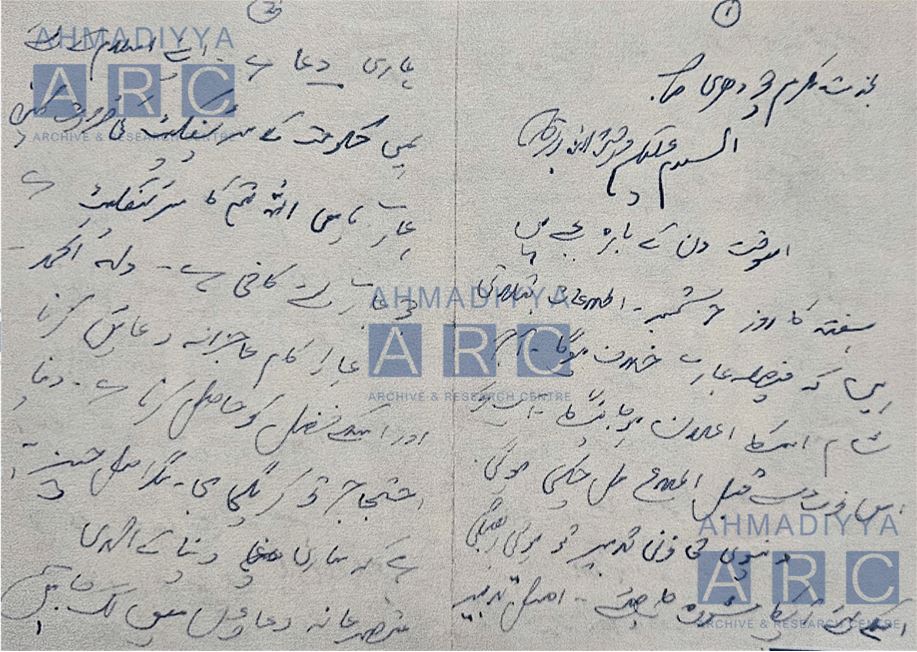
After this, Huzoorrh mentioned that Allah the Almighty has foretold him about the future circumstances:
“As to when it will happen? He [God] alone has knowledge about this.”
Huzoorrh further wrote:
“The circumstances suggest that in addition to this [upcoming legislation] more oppression would be carried out, and we [will act in the following manner]:
نہاں ہم ہو گئے یارِ نہاں میں
“[We hid ourselves in that Veiled Beloved. (A line from the Promised Messiah’sas poem)]
“He Who is Truthful in His promises, will surely fulfil His promises. We will have to raise the level of our sacrifices.” (File)
Disowned as citizens
As foretold by Hazrat Khalifatul Masih IIIrh, even more stringent regulations were imposed on the Ahmadiyya Muslim Community in Pakistan. Since 1984, they have been deprived of basic rights, particularly through Presidential Ordinance XX.

Even today, every effort is being made to stop Pakistani Ahmadi Muslims from practising their Faith. A recent ruling by the Supreme Court of Pakistan is another example of this ongoing oppression.
Reflecting on this decision, during his concluding address at the 2024 Jalsa Salana Germany, Hazrat Mirza Masroor Ahmad, Khalifatul Masih Vaa, stressed that Ahmadi Muslims need not rely on any human judgements but should place their trust solely in Allah, the One true God. He encouraged Ahmadis to engage in sincere prayer and worship, trusting that Allah would bring about relief and ease while confounding the enemies of the Jamaat.
Discrimination faced by Ahmadi Muslims in Pakistan is beyond imagination. I can testify to this personally, having faced such persecution while in Pakistan.
Ahmadi Muslims are labelled as the enemies of Islam and unfavourable for the Muslim interest. Pakistani Ahmadis are even declared as traitors to their country. Yet, history tells a different story, revealing their long-standing contributions to the Muslim cause.
Ahmadiyya services for the Muslim cause
The Ahmadiyya Muslim Community has a rich history of advocating for Muslim rights all across the globe – in British India, Turkey, Indonesia or the Arab World – particularly Palestine, Iraq, Syria, Egypt and Tunisia.
On one hand, the opponents of Ahmadiyyat declared the Ahmadiyya Muslim Community as non-Muslim, on the other, Ahmadi Muslims have always been at the forefront of making efforts for the Muslim world’s progress and success.
When we specifically glance into British India and the Arab world, we find that the Second Ahmadiyya Khalifa, Hazrat Mirza Bashir-ud-Din Mahmud Ahmadra, always advocated for Muslim rights. Moreover, he would also call the attention of the British government towards fulfilling the rights of Muslims and acting with justice.
For instance, the Ahmadiyya Khalifa prevented Muslims from being drawn into civil disobedience on multiple occasions, advocated for the rights of Turkey and the Arab territories, provided a coherent response to anti-Islam rhetoric, convinced Jinnah about the separate electorates that were inevitable for Indian Muslims considering the prevailing circumstances, resolved the Muslim League’s internal rifts, advocated for the rights of oppressed Kashmiri Muslims, wrote letters to the Viceroy and the British Prime Minister calling their attention towards the rights of the Muslims, and announced support for the Muslim League – major representative of Indian Muslims – in the 1945-46 elections. These are just a few examples of countless services.
Ahmadi Muslims and Pakistan
When speaking of the persecution of Ahmadi Muslims in Pakistan, one must also acknowledge the services this Community has rendered to their homeland.
It is an undeniable fact that Pakistan’s existence would have been impossible without separate electorates in British India and the Muslim League’s success in the crucial 1945-46 elections. In both matters, Ahmadi Muslims played a huge role.
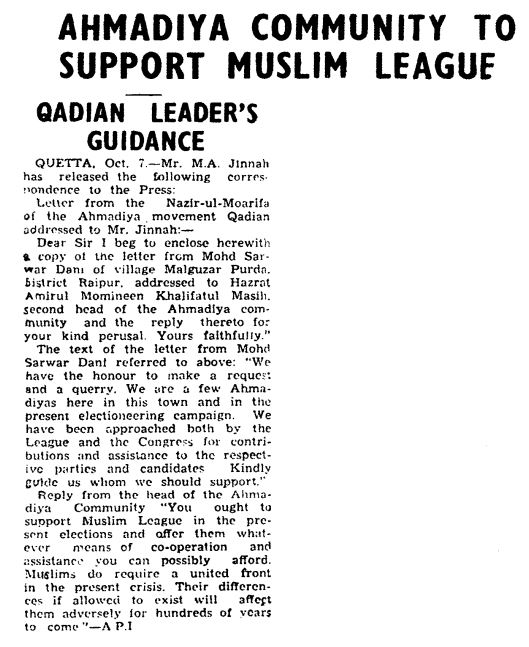
It is not merely hearsay, but rather, a testified fact. For instance, a well-known journalist, Raees Ahmad Jafri (1908-1968), has written in his book Quaid-e-Azam Aur Unka Ehad – Hayat-e-Muhammad Ali Jinnah that the Ahmadiyya Muslim Community favoured the Muslim League, Pakistan Movement and the political leadership of Jinnah. He then quoted the Second Ahmadiyya Khalifa’s above-mentioned announcement regarding the 1945-46 elections, and raised a very pertinent question as to who was supporting the establishment of Pakistan, showing concern for the future of Muslims and striving for their success. He finally answers his question himself:
“Those against whom there is a knapsack of the edicts of ‘kufr’, whose non-Muslimness is talked about everywhere, [and] whose faith and belief is considered to be doubtful, suspicious and objectionable.” (Quaid-e-Azam Aur Unka Ehad – Hayat-e-Muhammad Ali Jinnah, pp. 344-346)
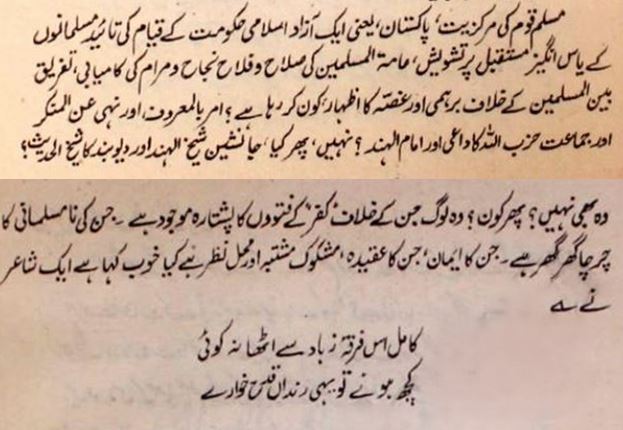
The history of Ahmadis’ sacrifices and services for Pakistan continues, even after the country’s establishment.
Once Pakistan was established in 1947, the Second Ahmadiyya Khalifa provided valuable guidance to the newly formed country and advised the public and the government to understand their responsibilities for the successful future of Pakistan. For instance, he delivered two separate series of lectures in 1947-48 in various cities of West Pakistan, titled “Consolidation of Pakistan” and “Pakistan and its Future”.
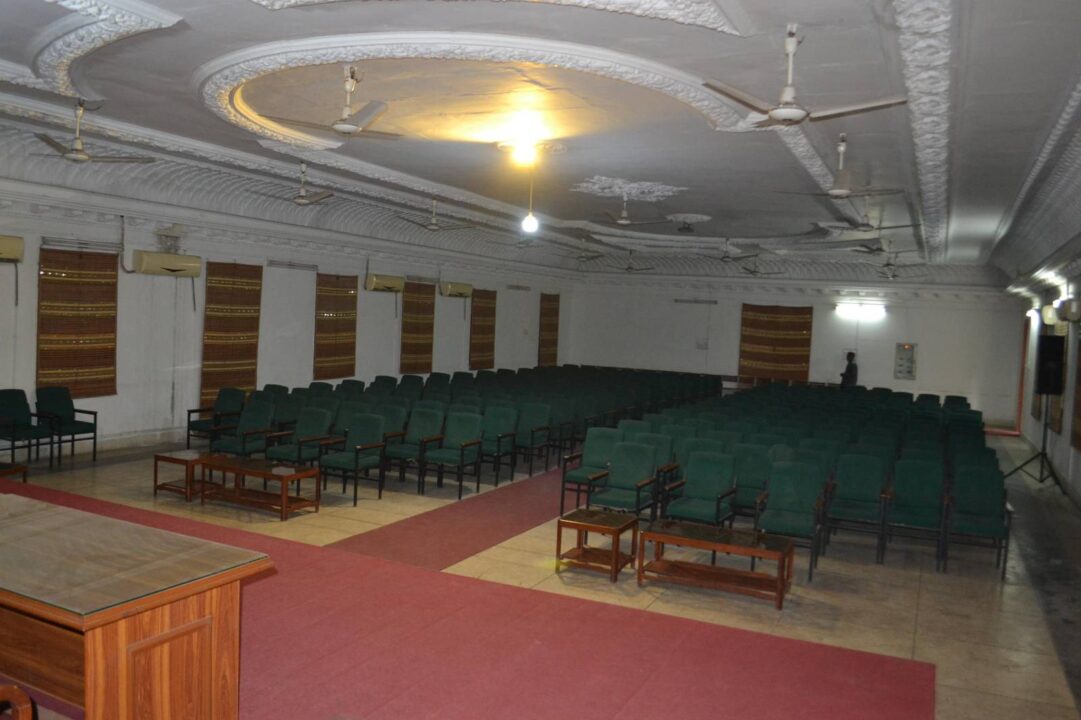
In 1953, a huge storm of opposition and persecution erupted against the Ahmadiyya Muslim Community and Ahmadis were labelled as traitors and enemies of the country. However, Pakistani Ahmadis still did not quit their loyalty to the country, and on certain occasions when the country’s existence and sovereignty were challenged, Ahmadis were at the forefront in safeguarding it.
Then came the year 1974 and Ahmadi Muslims were declared non-Muslims by the Parliament of Pakistan. At that time, the Community was being led by the Third Ahmadiyya Khalifa, Hazrat Hafiz Mirza Nasir Ahmadrh. On several important junctures, he granted valuable guidance to the people and leadership of Pakistan for the country’s betterment and progress, and always encouraged the Ahmadis of Pakistan to serve their homeland despite the ongoing persecution.
One may ask, “Why did the Ahmadis of Pakistan not cease their loyalty to their country after the proceedings of 1974?” Well, Ahmadi Muslims adhere to the teachings of Islam that declare one’s love for their homeland as part of their Faith.
Then came 1984, and stricter legislations were made against Ahmadi Muslims and all possible efforts were made to suppress them as a community. At that time, the Community was being led by the Fourth Ahmadiyya Khalifa, Hazrat Mirza Tahir Ahmadrh. Following in the footsteps of the previous Khulafa, he also granted valuable guidance for the homeland’s progress and betterment on an array of subjects.
However, with the intensifying persecution and opposition, Khilafat-e-Ahmadiyya migrated from Pakistan to England according to Divine decree, which laid the foundation of a new era of progress for this Jamaat.
Even at that stage, and till this day, Ahmadi Muslims of Pakistan did not cease their love and loyalty to their homeland and this fact really makes people wonder as to “Why?”. The answer is the same: Islam teaches one to love their homeland.
History testifies to the fact that the Ahmadi Muslims of Pakistan served their homeland with utmost loyalty, and made efforts for Pakistan’s progress and success. Prominent among them are Hazrat Sir Chaudhry Muhammad Zafrulla Khanra, Sahibzada Mirza Muzaffar Ahmad, Lieutenant-General Akhtar Hussain Malik Sahib, Lieutenant-General Abdul Ali Malik Sahib, Professor Dr Mohammad Abdus Salam Sahib, and many more.
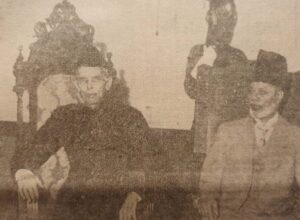
A glimpse of the services rendered by the Ahmadiyya Muslim Community for the Muslim world, and in connection to Pakistan, has been narrated in several articles that have been published in The Weekly Al Hakam. These articles also make it evident that the Ahmadi Muslims of Pakistan have excelled in various fields and represented their country at the international level on many platforms, including sports. Moreover, the town of Rabwah, in addition to being the centre of a religious community, has been a shining example of excellence in the field of academics and sports as well.
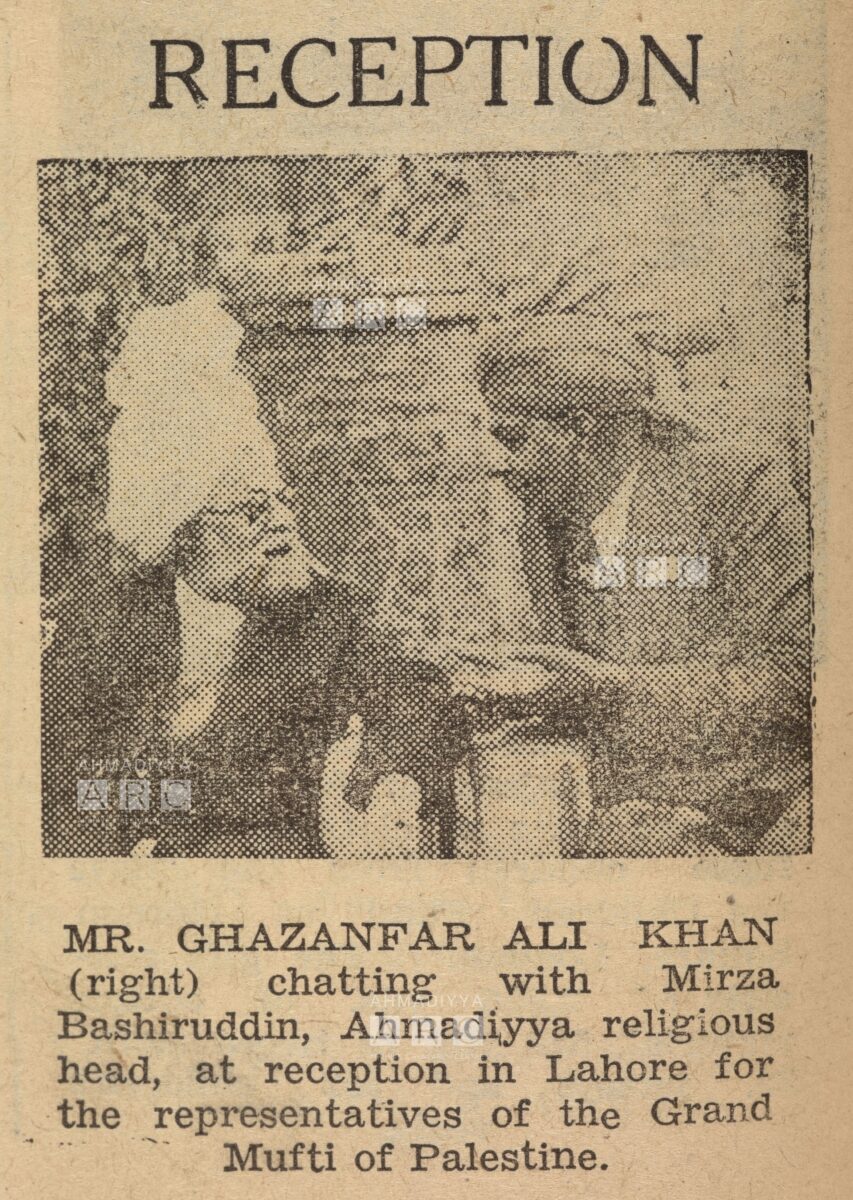
Conclusion
In short, there is no denying the fact that the Ahmadi Muslims of Pakistan have been at the forefront of contributing towards the establishment, stability, integrity and development of their homeland – a history that is often veiled by anti-Ahmadiyya proponents. Sadly, despite their immense sacrifices and services for Pakistan, Ahmadis are labelled as “traitors” and “enemies of the country”, a narrative perpetuated by clerics who demand to remove Ahmadis from key positions of various departments. Amidst all this, the Ahmadis of Pakistan have a relation of love and loyalty to their country, as per the Islamic teachings.
The Ahmadiyya Muslim Community has been under siege in Pakistan for the past 50 years. Yet, despite these hardships, they continue to pray for the prosperity of their homeland – a country for which they and their elders have made great efforts and sacrifices.

